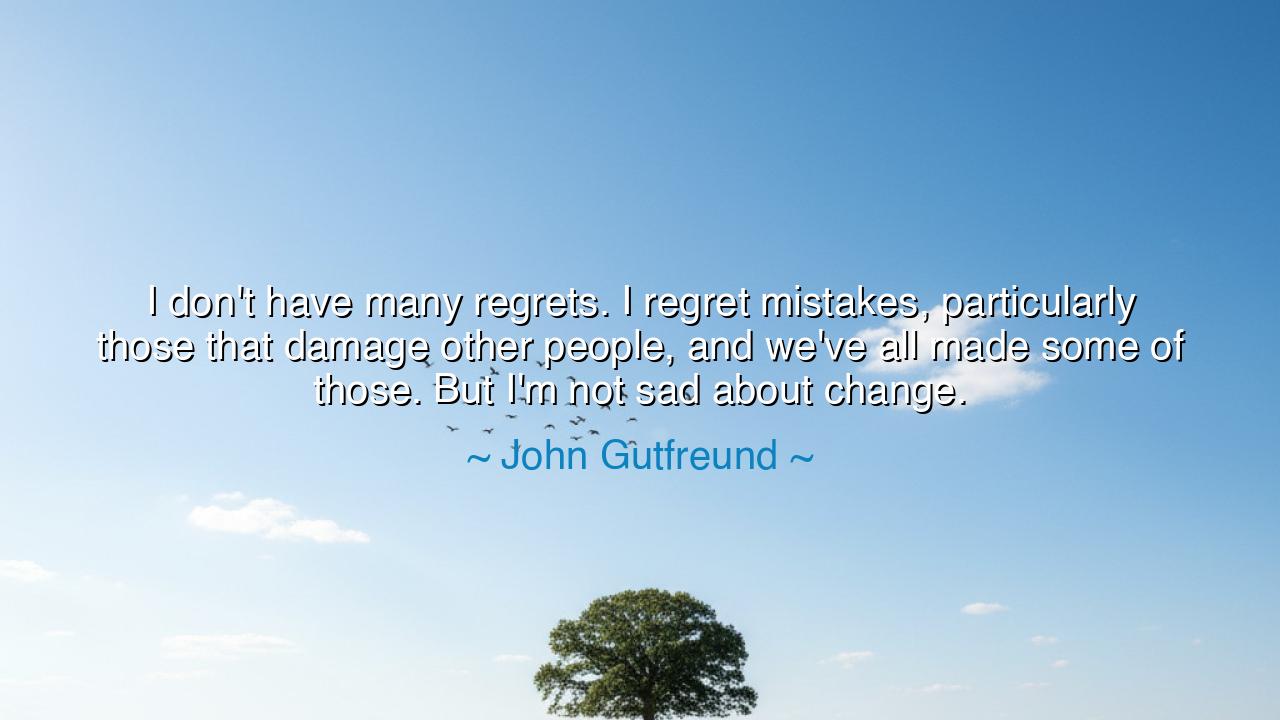
I don't have many regrets. I regret mistakes, particularly those
I don't have many regrets. I regret mistakes, particularly those that damage other people, and we've all made some of those. But I'm not sad about change.






There are truths in life that distinguish between fleeting sorrow and enduring wisdom. John Gutfreund, reflecting on his personal philosophy, said, “I don't have many regrets. I regret mistakes, particularly those that damage other people, and we've all made some of those. But I'm not sad about change.” In these words lies a meditation on accountability, growth, and acceptance. Gutfreund separates the pain of ethical lapses from the natural currents of life, teaching that while we must acknowledge the consequences of our actions, we need not mourn the inevitable transformations that shape our existence.
Gutfreund’s reflection highlights the moral weight of regret. Ancient thinkers, from Aristotle to Confucius, emphasized that ethical missteps are worthy of reflection, particularly when they harm others. Such mistakes are instructive, offering opportunities to cultivate virtue and understanding. By acknowledging errors that damage others, Gutfreund exemplifies the timeless principle that conscience is the guardian of moral development, reminding us that regret, when focused on ethical responsibility, is a tool for growth rather than a source of despair.
Yet he distinguishes these regrets from the inevitability of change, embracing the natural evolution of life without sorrow. Change, in itself, is neither virtuous nor harmful; it is a constant, shaping the trajectory of individuals and communities alike. Stoic philosophers, particularly Marcus Aurelius, taught that resistance to change is futile, and that wisdom lies in aligning oneself with the flow of events. Gutfreund’s acceptance mirrors this ancient insight: transformation is to be understood and embraced, not mourned.
History provides numerous illustrations of this duality. Consider Abraham Lincoln, who faced immense personal and political change throughout his life. Though he mourned failures and personal losses, he accepted the transformations imposed by circumstance and duty. His regrets were measured, focused on errors that harmed others, while his response to change was strategic, forward-looking, and unburdened by needless sorrow. Gutfreund’s reflection resonates with such historical wisdom: accountability and acceptance are complementary virtues.
The recognition of mistakes that harm others also speaks to the social dimension of human ethics. We are embedded in networks of relationships, and our choices reverberate through the lives of those around us. Ancient moral traditions, from the Confucian emphasis on filial and communal duty to the Greek ideal of civic responsibility, underscored the importance of minimizing harm to others. By acknowledging these errors, Gutfreund affirms that ethical reflection is not merely personal, but relational—a recognition of the human interconnectedness that defines moral life.
At the same time, Gutfreund’s refusal to lament change illustrates the transformative potential of impermanence. Life’s flux, though sometimes disorienting, is also the source of growth, opportunity, and renewal. The ability to embrace change without sorrow is a mark of resilience and wisdom. As Heraclitus observed in ancient Greece, “No man ever steps in the same river twice,” emphasizing that life is continuous transformation, and the wise do not grieve its flow but navigate it with awareness and purpose.
From Gutfreund’s reflection emerges a timeless lesson: cultivate discernment in regret, focusing on mistakes that cause harm, while accepting the inevitability of change without sorrow. Self-examination must serve moral and ethical growth, and the passage of life should be met with curiosity, courage, and engagement rather than lamentation. To distinguish between what deserves sorrow and what demands acceptance is to live wisely and fully.
Thus, let John Gutfreund’s words guide us in life: acknowledge the impact of your actions on others, learn from ethical missteps, and release the burden of mourning the natural transformations of existence. In doing so, we honor responsibility without succumbing to unnecessary melancholy, embracing life’s flux with integrity, clarity, and resilience.






AAdministratorAdministrator
Welcome, honored guests. Please leave a comment, we will respond soon